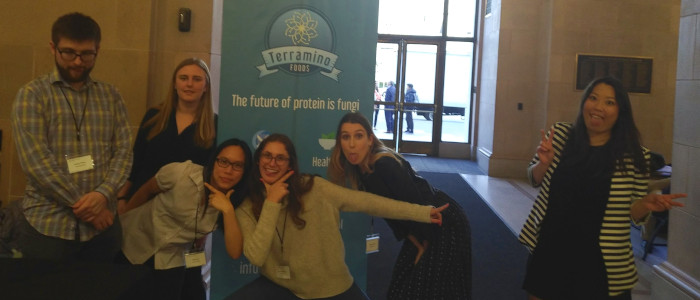Written by Anna Hirschorn
Spring 2018
“The future of protein is fungi”… is Terramino Foods’ catchphrase. They’re proving it true. Terramino’s goal is to create a sustainable alternative to seafood using a nutrient-dense and texturally comparable fungi. Why? Because classic seafood production is plagued by a host of environmental problems.
On our website (created, actually, by myself and the other intern but more on that later) we list some of the core problems of the seafood industry:
- Terramino products were created with the hope of satisfying seafood lovers while mitigating harm to the marine environment.
- More than half of all global fisheries are fully fished and a third are overfished.
- Larger fish species, including some of our favorites like tuna and salmon, are among the most vulnerable.
- Rates of bycatch are high and many fisheries throw away more fish than they keep.
- Half the seafood consumed in the U.S. is farmed, but few fish farms follow sustainable practices.
- Fish farms rely heavily on pesticides, antibiotics, and other chemical treatments, making them a breeding ground for pollution and antibiotic resistance.
Further, I was shocked to learn about the convoluted path that seafood takes from the ocean to our plates. In the United States, it begins with fisherman, fish farmers, and US importers (who get fish from foreign fisherman and fish farmers). Fish then goes through two stages of processing which results in only about 30 percent retention of the beginning weight of the fish. Next, brokers, traders, and distributors buy from processors and often trade among themselves before selling to either broadline distributors or specialty seafood distributors. Fish then travels from the distributors to supermarket hubs (and then individual supermarkets) or food service companies (which then ship to individual schools, hospitals, restaurants, etc.). Terramino cuts out all these middle men and the associated environmental, health, and economic harms.
I had many responsibilities throughout my time at Terramino. I began as an analytic intern, researching the seafood supply chain and the market for seafood and alternative meats. However, as the semester progressed, I was charged with whatever task, large and small, that needed to get done. Working at Terramino kept me on my toes: one week, I made the hors d’oeuvres for a reception at Indie Bio and the next I built Terramino’s website (check it out at terramino.com!). I never know what would be thrown at me to do. For me, this was both a good and bad aspect of working at a startup. I felt like I was getting a sneak peek into all different aspects of a company as well as learning how to be flexible and adaptable. At times, however, it was also stressful: to be put in charge of things that you have no experience with when the outcomes really matter to the success of the company is nerve-wracking.
That being said, this job pushed me to try my best at everything they asked me to do. I care about the future success of the company and want my work to be a sound building block for that success. Kim and Josh (the founders) are great bosses: they’re understanding and inspiring. The amount of time they spend working on Terramino is wild: it’s their entire life (sometimes they even sleep over at the offices!). But I think that’s just what’s necessary to get a startup going. With all the work they had for themselves, I greatly appreciate the time and energy they took to guide me and teach me about this world!
I was lucky to be at Terramino during an exciting time of growth. While I was there, Terramino closed its seed round investment – the first at Indie Bio to do so! The company was also featured in the Wall Street Journal (according to them, a “company to watch”) and in Fast Company. Their review? “Side by side with a salmon burger from Whole Foods, the fungi-based burger is nearly indistinguishable.”
I’ve learned a lot at Terramino. Some lessons were more tangible than others, i.e. how to build a website, and some lessons will impact my work style in the future, i.e. how to roll with the punches, but Terramino has also taught me a core lesson about the food world: it’s possible to be both a successful company and to change the world. It often seems as if there’s a war between big business and the “little guys” trying to save mother Earth. And sometimes this is actually the case… but Terramino has taught me that it’s okay to break from these traditional roles and allow each perspective to inform the other. By becoming successful, Terramino can make systematic environmental change. However, it can also use its sustainable values to become successful. Terramino is a startup, working to become economically viable and break into lucrative market. But the company also has revolutionary underpinnings. The merging of these two values makes Terramino a powerhouse, hopefully allowing for future success for both the company and our food systems. Terramino has shown me that maybe we don’t have to choose between financial prosperity and environmental triumph, but that each can set the stage for the success of the other.

